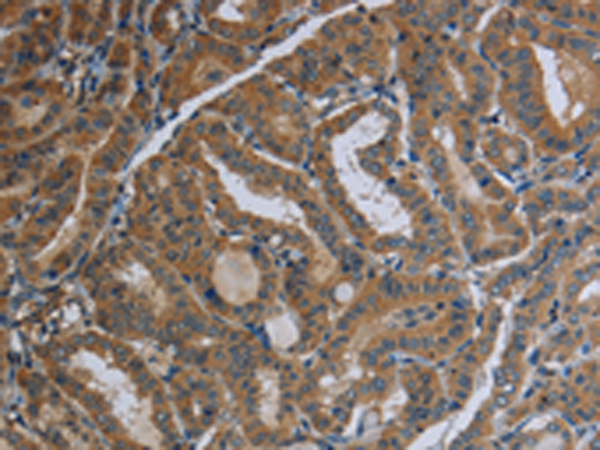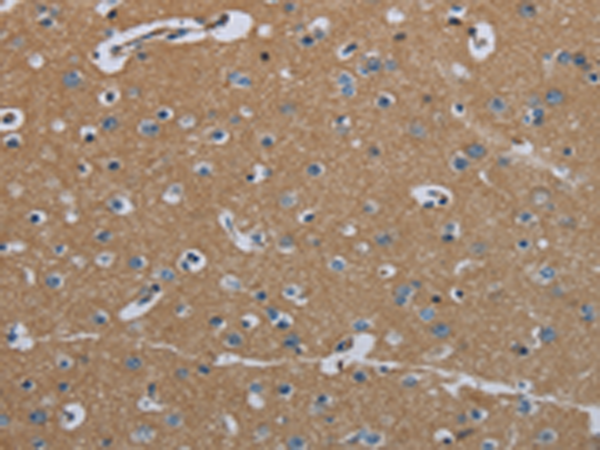

| WB | 咨询技术 | Human,Mouse,Rat |
| IF | 咨询技术 | Human,Mouse,Rat |
| IHC | 1/50-1/200 | Human,Mouse,Rat |
| ICC | 技术咨询 | Human,Mouse,Rat |
| FCM | 咨询技术 | Human,Mouse,Rat |
| Elisa | 1/2000-1/5000 | Human,Mouse,Rat |
| Aliases | PSAB; FAAH-1 |
| Host/Isotype | Rabbit IgG |
| Antibody Type | Primary antibody |
| Storage | Store at 4°C short term. Aliquot and store at -20°C long term. Avoid freeze/thaw cycles. |
| Species Reactivity | Human, Mouse, Rat |
| Immunogen | Fusion protein of human FAAH |
| Formulation | Purified antibody in PBS with 0.05% sodium azide and 50% glycerol. |
+ +
以下是关于FAAH(脂肪酸酰胺水解酶)抗体的3篇文献概览,供参考:
---
1. **文献名称**:*Immunohistochemical localization of fatty acid amide hydrolase (FAAH) in rodent and primate brain*
**作者**:Egertová, M., Cravatt, B.F., & Elphick, M.R.
**摘要**:该研究通过制备特异性FAAH抗体,系统分析了啮齿类和灵长类动物大脑中FAAH的分布,发现其高度富集于神经元中,并与内源性大麻素信号通路相关脑区(如皮层、海马)密切相关。
---
2. **文献名称**:*Selective blockade of 2-arachidonoylglycerol hydrolysis produces cannabinoid behavioral effects*
**作者**:Long, J.Z., Li, W., Booker, L., et al.
**摘要**:研究通过FAAH抗体和药理学工具,验证了特异性抑制FAAH可增加内源性大麻素AEA水平,并显著缓解炎症性疼痛和焦虑样行为,提示FAAH抗体在靶向治疗中的潜在应用。
---
3. **文献名称**:*A fluorescence-based assay for fatty acid amide hydrolase compatible with high-throughput screening*
**作者**:Patricelli, M.P., & Cravatt, B.F.
**摘要**:开发了一种基于FAAH抗体的高通量荧光检测方法,用于快速筛选FAAH抑制剂,并验证了抗体在酶活性定量分析中的特异性,为药物开发提供了技术基础。
---
以上文献均聚焦FAAH抗体的制备、应用及其在神经科学和药物研发中的作用,涵盖分布研究、行为学机制及技术方法开发。如需具体文献编号或补充其他研究,可进一步说明。
The fatty acid amide hydrolase (FAAH) antibody is a critical tool in studying FAAH, an enzyme responsible for metabolizing endocannabinoids like anandamide. FAAH regulates signaling pathways involved in pain, mood, and inflammation by breaking down bioactive lipid mediators. Researchers developed FAAH antibodies to detect, quantify, and localize FAAH expression in tissues, enabling insights into its physiological and pathological roles. These antibodies are widely used in techniques such as Western blotting, immunohistochemistry, and ELISA to investigate FAAH distribution in the central nervous system, immune cells, and peripheral tissues.
FAAH has therapeutic relevance due to its association with neuropsychiatric disorders, chronic pain, and metabolic diseases. Antibodies aid in validating FAAH as a drug target, particularly for inhibitors designed to elevate endocannabinoid levels. Specificity is ensured through epitope mapping, often targeting unique regions of FAAH’s catalytic domain. Cross-reactivity studies confirm recognition across species (e.g., human, rodent), supporting translational research. Recent applications include studying FAAH in neurodegenerative diseases, cancer, and gut-brain axis modulation. However, challenges remain in standardizing antibody performance across experimental models. Overall, FAAH antibodies remain indispensable for unraveling the enzyme’s complex roles and advancing therapeutic strategies targeting the endocannabinoid system.
×